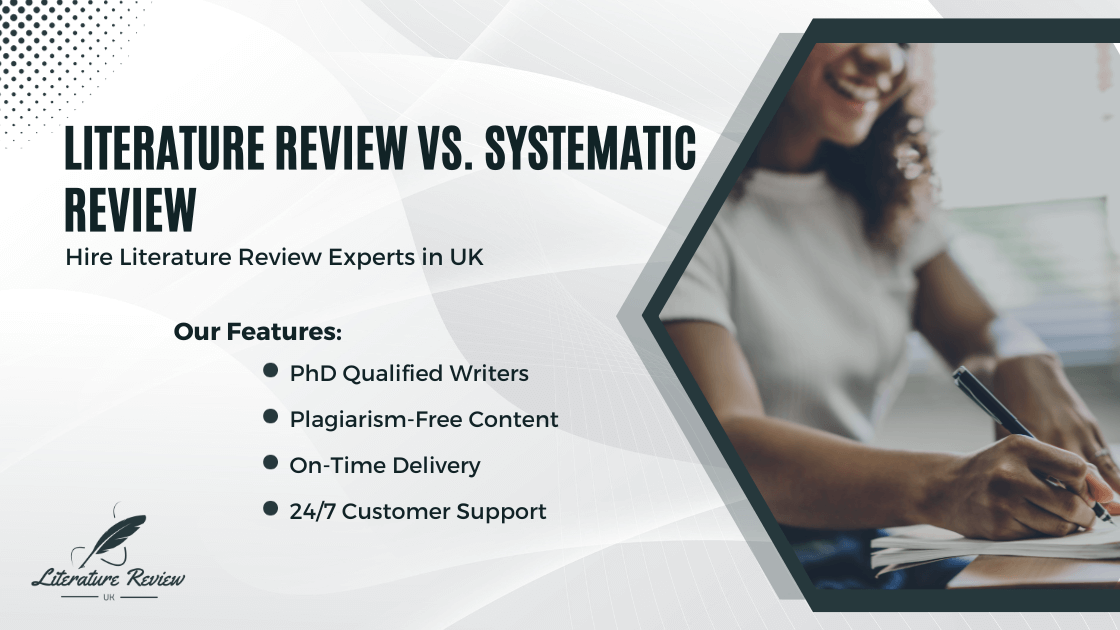
In the world of academia and research, the terms “literature review” and “systematic review” are often used interchangeably. However, these two forms of review serve distinct purposes, follow different methodologies, and offer unique contributions to the body of knowledge. In this comprehensive guide, we will delve into the key distinctions between literature reviews and systematic reviews. By the end of this article, you’ll have a clear understanding of their differences and be better equipped to choose the right approach for your research endeavors.
The Essence of Literature Reviews
Literature reviews are a familiar component of academic research. They involve the systematic examination and synthesis of existing literature on a particular topic or subject area. The primary goal of a literature review is to provide an overview of what is currently known about a topic, identify gaps in the existing knowledge, and set the stage for new research.
Key Characteristics of Literature Reviews:
-
Broad Focus: Literature reviews often cover a broad range of sources, including books, articles, theses, and other scholarly works.
- Narrative Approach: They typically employ a narrative or descriptive approach, summarizing and synthesizing existing research without a strict, predefined methodology.
- Varied Methodologies: Literature reviews do not follow a rigid methodology. Instead, they may include sources that use a wide range of research methods.
-
Inclusive Approach: A literature review aims to be inclusive, providing an overview of all relevant research, including both qualitative and quantitative studies.
The Role of Systematic Reviews
Systematic reviews, on the other hand, are a more structured and rigorous form of review. They involve a systematic and comprehensive search of the literature, followed by a meticulous analysis and synthesis of the included studies. The key purpose of a systematic review is to provide an exhaustive and unbiased summary of the available evidence on a particular topic, often to answer a specific research question.
Key Characteristics of Systematic Reviews:
-
Focused Inquiry: Systematic reviews are highly focused and target a specific research question, often guided by a predefined research protocol.
- Structured Methodology: They follow a structured methodology, including a detailed search strategy, strict inclusion and exclusion criteria, and a formal data extraction and analysis process.
- Transparent and Reproducible: Systematic reviews prioritize transparency, reproducibility, and minimizing bias in the selection and analysis of studies.
-
Quantitative Analysis: Systematic reviews frequently involve statistical analysis and meta-analysis to quantitatively summarize the findings of included studies.
Narrative Review vs. Systematic Review
A narrative review, like a traditional literature review, provides a qualitative summary of existing research. It presents a narrative or descriptive account of the literature and typically does not employ the rigorous methodology seen in systematic reviews. In contrast, a systematic review follows a well-defined and transparent methodology, aiming to minimize bias and subjectivity in the review process.
Key Differences:
- Narrative Review: Typically lacks a formal methodology and is more subjective.
- Systematic Review: Follows a strict methodology, employs a structured search process, and aims to provide an unbiased, quantitative summary of research findings.
Key Distinctions: Literature Review vs. Systematic Review
To grasp the core differences between literature reviews and systematic reviews, consider the following key distinctions:
1. Research Question and Focus
- Literature Review: Offers a broad overview of existing knowledge and may not have a specific research question.
- Systematic Review: Focuses on a clearly defined research question and aims to provide a comprehensive and unbiased answer.
2. Methodology
- Literature Review: Lacks a formal, structured methodology and does not necessarily follow a predefined research protocol.
- Systematic Review: Follows a structured methodology, including a systematic search, strict inclusion and exclusion criteria, and often employs meta-analysis.
3. Inclusion Criteria
- Literature Review: Inclusion criteria may be less rigorous, and a wide range of sources may be included.
- Systematic Review: Utilizes strict inclusion and exclusion criteria, ensuring that only high-quality, relevant studies are considered.
4. Analysis Approach
- Literature Review: Typically uses a narrative or descriptive approach to summarize and synthesize research findings.
- Systematic Review: Often involves quantitative analysis and may include statistical techniques like meta-analysis.
5. Bias and Transparency
- Literature Review: May not prioritize minimizing bias and is often less transparent in the selection and analysis of studies.
- Systematic Review: Places a strong emphasis on minimizing bias, ensuring transparency, and following a reproducible methodology.
Nursing Literature Review: A Specialized Application
In the field of nursing, literature reviews play a crucial role in synthesizing evidence-based practice. Nurses frequently conduct literature reviews to inform their clinical decisions, policy recommendations, and research initiatives. These reviews aim to provide a comprehensive understanding of a specific nursing topic or issue, often without the rigor of a systematic review.
It’s important for nurses and healthcare professionals to recognize the distinction between literature reviews and systematic reviews. While systematic reviews are the gold standard for evidence-based practice and guideline development, literature reviews serve as valuable tools for gaining an initial understanding of a nursing topic and identifying gaps in the literature.
Conclusion
Understanding the key distinctions between literature reviews and systematic reviews is essential for researchers, students, and professionals across various fields. Literature reviews offer a broad overview of existing research, providing a foundation for further study and research questions. In contrast, systematic reviews follow a rigorous methodology to answer specific research questions and provide evidence-based guidance.
Whether you choose a literature review or a systematic review depends on your research objectives, the scope of your inquiry, and the level of rigor required. By recognizing the differences between these two approaches, you can select the right method to advance your academic or professional endeavors, contributing meaningfully to your field of study.




